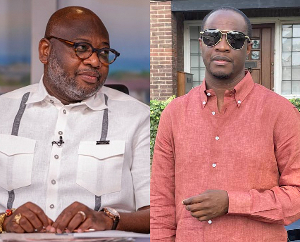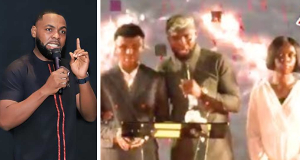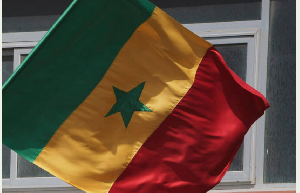By Kofi Ata, Cambridge, UK
I have been unable to listen to or watch all the daily coverage of the Supreme Court (SC) presidential petition hearing and therefore my analysis of the cross examination, thus far, of Dr Bawumia, the key witness and second petitioner by Mr Tsatsu Tsikata, lead Counsel for the third respondent is partly based on both eye witness account and media reports and therefore may not be entirely objective. In this third of petition hearing articles, I will do my best to share my observations over the past two weeks as objective as I can. I should also be honest and point out that I knew Tsatsu through Rawlings even before the PNDC days.
Before I go into any details, permit me to make some general observations on the belated “Amicus Curiae Brief” application that came before the Justices out of the blue. This petition is throwing up very interesting aspects of the legal profession in Ghana. The Attorney who appeared before the SC to make this unusual application sounded to me as either under the influence of alcohol or some illegal substance. We also heard of one NDC lawyer claiming that he would be happy to die after he is heard Tsatsu cross examine Bawumia and last but certainly not the least, another lawyer and NPP General Secretary elevated Bawumia to level of a god. Folks, are some insane people parading as lawyers in Ghana? It’s worst if the failed suit by retired SC Justice Kpegah is added to the list of bizarre behaviours by these men of learned friends from the Bar.
I missed the infamous “Tsatsu shup up” in court episode. What a tragedy? This is simply uncouth, unprofessional and unacceptable. This is not an ordinary court but the highest court of the land as well as the case being watched across the world and so all parties should put up their best behaviour, ethically and professionally. This is not the Tsatsu I knew, though I must admit that if you have never met him, the quiet Tsatsu could come across as intellectually arrogant but that is far from the truth. In my view, it appears Tsatsu is having difficulty to reconcile with the fact that, he finds himself at the opposite end of the court with students he might have taught and cannot take any heckling or disruption from them. My advice to my good old friend or colleague is, whether you taught them law or not, once you are in court with them at the opposite end, you are all equals before the Justices. This is a court room and not the lecture hall, where the lecturer reigns supreme. Again, do not let the NPP attacks on you get the better part of you and accord your opponents the due respect.
Lead Counsel for the third respondent (NDC) began his cross examination on aggressive attack. This was surprising to me for a number of reasons. First, even if the petitioners' key witness was wounded by the cross examination of the lead Counsel for the first respondent, the weak performance of the lead Counsel for the second respondent might have given the witness ample time to recover in the ring. To go on such aggressive attack from the word go as if to knock the witness out was very unrealistic. Again, this tactic is good for a weak witness but Bawumia is a formidable one who no matter what punches he receives in the box keeps standing on his feet. It was no surprise he subsequently revised his strategy and went on the defensive or mild attack.
I was shocked by the level and nature of cross examination from the lead Counsel for the second respondent, the Electoral Commission (EC). In fact, he should have done the type of cross examination being conducted by the lead Counsel for the third respondent. If this is anything to go by, it is no surprise that the state often loses cases that should have been straight forward victory. I wonder how much the EC is paying him for this “no show performance”. The EC has all the originals of pink sheets that could have been relied upon to challenge the petitioners’ claims of over voting, voting without biometric verification and others. Unless of course, the originals as I suspect contain the same errors or irregularities, I find the failure of the EC to present the original pink sheets as exhibits to be used for cross examination abominable. Thanks to the work being done by the lead Counsel for the third respondent, EC has got “buy one, get one free”. Pay for the services of Mr Quarshie Idun and get the services of Mr Tsikata free.
To be honest, lead Counsel for the third respondent has been sometimes frustrating in his cross examination by the repetitive and long winding nature of his questioning. On some days that I listened to him, after laying the foundation for his questions, he sometimes deviates and not following it up with the relevant question/s. For example, the first time he explored the role and importance of the party agents at polling stations, instead of directly asking if the witness still believed that they were “mere agents”, he failed to do so at that material moment only for him to return to the same subject later but this time, posed the question he could have asked earlier. Perhaps, that could be why the NPP is accusing him of deliberate time wasting and even attacking him personally.
Another weakness displayed by lead Counsel in cross examination is raising matters that ought to be in his closing address to the Justices. By raising them earlier, he offers unsolicited advantage to the opponent as it gives lead Counsel for the petitioners the advantage of finding antidote to such matters in advance, instead of responding to them within a very short time of the closing addresses. Despite reminders from the bench to reserve such matters for his address, he continues to repeat the mistakes.
I do not blame lead Counsel for the third respondent for these lapses in the court room as he is more of an academic lawyer than a practicing Attorney. In spite of these faults, he is making inroads into building a good defence for the respondents. For example, through his thorough cross examination and interrogation of the pink sheets, the key witness has admitted to mistakes of duplication, triplication and mislabelling of pink sheets. Again, he has identified that similar mistakes, administrative errors, irregularities or malpractices also occurred in the petitioners’ strongholds and has accused the petitioners of acting in bad faith for not presenting pinks sheets from their strongholds as exhibits. That is, for selecting pink sheets from predominantly NDC strongholds. If really the petitioners are genuinely worried about statutory omissions, irregularities and malpractices during the 2012 Presidential Election, which they must and indeed, all Ghanaians, then they should have examined pink sheets from all the over 26,000 polling stations and not only those from NDC strongholds.
But why none of the three respondents exhibited pink sheets from strongholds of the petitioners also beats my imagination. The simple reason is that, all the four parties involved in the case are protecting their interests. The petitioners avoided presenting pink sheets exhibits from their strongholds because the mistakes, administrative errors, irregularities or malpractices would disproportionately affect them and doing so would have been committing suicide or cutting your own nose to spite your face. In the same vein, the respondents failed to exhibit pink sheets from NPP strongholds since that would have been an admission that such mistakes, administrative errors, irregularities or malpractices occurred throughout most, if not all the 26,000 polling stations. That could make the presidential election not credible and probably strengthen the petitioners’ case. Both sides are unwilling to be Taliban or Al Qaeda style suicide bombers but rather protect their individual and party interests. The main objective of the petitioners is not about democracy or strengthening democracy in Ghana as they claimed but the interests of individuals and partisan party politics, though improved elections in the future would be a bye product of the petition.
I disagree with those who claim that lead Counsel for the third respondent is doing a bad job in his cross examination. Probably we are not listening to the same broadcast. Irrespective of his repetitive and winding style, he is doing a good job. Why do I say so? First, the attempt by the petitioners’ lead Counsel to stop him from cross examining the witness and the personal attacks on him by the NPP machinery (Communication Team, members, supporters and sympathisers) are indications that the third respondent's lead Counsel is causing damage to their case. I even believe that the petitioners’ lead Counsel was aware that Tsatsu could cause potential damage when given the chance to cross examine the key witness. Remember his words, “to have a bite of the cherry” in raising his objection that was overruled. If he was doing a bad job, why the attacks by NPP and not from NDC?
Those who also accuse him of deliberate delay tactics do not really understand the court system because failure on the part of respondents’ lead Counsels to subject the totality of the evidence (exhibits) to scrutiny would be at their own peril. Once submitted, exhibited in court and accepted as part of the proceedings, if unchallenged through cross examination, then that becomes accepted facts before the court. The petitioners' lead Counsel would have a bonus in his closing address to the Justices to point out how the evidence was not challenged. So Counsel for the third respondent is doing the right thing and it would have been dereliction of duty on his part not to do so as Counsel for the second respondent did. It is not the duty of the bench to identify inconsistencies and contradictions but the defendants to do so during cross examination and let the bench be aware accordingly.
So far, so good for the key witness and second petitioner, at least in one area. That is, he has been very consistent in his approach, whether he is being economical with the truth or not. He is proven to be a strong witness in the face of being forced or compelled by another strong character to admit some mistakes (probably the battle of two “Oxford Giants”) . However, despite his consistency, the key witness has unwittingly contradicted himself on a number of occasions. He keeps on saying that “you and I were not there” or “I was not there”, so I cannot answer the question. However, the same witness is able to conclude that a blank on a pink sheet means over voting. Was he there this time to make a definitive statement? Again, on some occasions he claims he is not a lawyer so cannot answer legal questions put to him but at certain times, he says “only legal votes” must be counted. Is he aware that he is talking as a lawyer? What all the parties definite as legal or illegal votes in this petition is irrelevant because only the Justices can determine which votes are legal or illegal according to the rules of the game and the 1992 Constitution.
One would have expected that since the petitioners accused the second respondent (EC) of shoddy work and theft, the key witness who also led the collation of evidence on behalf of the petitioners would have been more meticulous, leave no stone unturned by ensuring that every ‘t’ and ‘i’ were crossed and dotted respectively before submitting the evidence to the court. If they had from December 10, 2012 to 5 April 2013 to put together their evidence of over 11,000 pink sheets and yet made mistakes, what moral authority do they have to accuse the EC of theft when they had hours, if not minutes to record information on 26,000 pink sheets? I am not justifying the EC’s incompetency, or the alleged malpractices and irregularities. They are paid to do the job and they should have given Ghanaians value for money. There is no excuse for their shortcomings.
Nonetheless, I still give the benefit of the doubt to the key witness regarding the duplication, triplication or quadruplication of the pink sheets because it is plausible for pink sheets from one polling station to be duplicated, triplicated or quadruplicated. This is because and according to the petitioners the omissions, irregularities and malpractices are in different categories. So, if at one polling station two categories of statutory irregularities of over voting and voting without biometric verification occurred, then, two pink sheets of the same polling station would be needed (one each for the two different categories). The problem or confusion is that, the key witness has failed to provide this explanation on the duplicates, triplicates and quadruplicates but only continue to say that the analysis contained only one pink sheet. That is not credible if the pink sheets are in categories. Again, the petitioners do not necessarily require as many as 11,000 pink sheets to prove their case.
There were also allegations of forgery by both sides. At one time, lead Counsel for the third respondent suggested to the petitioners’ key witness that either a signature on a pink sheet or the pink sheet itself was forged. The petitioners' key witness has also alleged that a letter signed by the first petitioner (Nana Akufo Addo) and sent to the second respondent (EC) regarding party agents for the alleged non-existing polling stations was received and stamped earlier than the date of the letter and therefore the letter could be a forgery. These are serious allegations of trust and honesty against a leading political party and a constitutional body. In my view such serious allegations ought to be properly investigated but I doubt if the SC is the appropriate venue for such investigations.
Another lesson from the hearing so far which could have serious implications for future elections (both positive and negative) is the awareness that, party polling agents must complete a complaint form if s/he disputes the declared results at a polling station. This could open a can of worms for dissatisfied, overzealous and recalcitrant party agents to raise unnecessary complaints and potentially delay the declaration of election results in the near future, though the filling of an election complaint would not necessarily stop the EC from declaring the results but serve as basis for the allegations to be investigated and grounds for future election petition.
To conclude, my view has not changed after three weeks of the hearing. That is, this case is far from over. The petitioners still have to prove their case in court but so far the respondents have an advantage, especially, if the alleged irregularities complained of also occurred in the strongholds of the petitioners but they decided to seek selective justice. I am not sure how the Justices would interpret such wholesale irregularities across the country. Would they see them as simply mistakes, administrative errors or what? That is anyone’s guess that I am not willing to bet on. I wish the Justices had ordered an audit of all the pink sheets from the over 26,000 polling stations.
One thing that I know is that, it is very shocking that a country that boasts of a leading light of democracy in Africa with high numbers of unemployed graduates could not assemble literate and numerate electoral officials to accurately input data and information on a simple electoral form. These simple arithmetic calculations could have been done by senior secondary school graduates. It’s a national disgrace. Whatever the outcome of this petition, elections in Ghana would never be the same again and I am sure the last bye election benefited from the lessons of this petition. The jury is still out.
Kofi Ata, Cambridge, UK
Opinions of Monday, 13 May 2013
Columnist: Ata, Kofi














